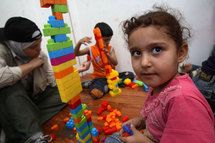
Are our grandparents coming for my birthday in April?
Zahra’s question came out of the blue as we walked to the park. My seven-year-old daughter has met her grandparents (my mother and father) only once, when she was almost three. But she remembers them and, like any other child coming up to special occasions such as birthdays and holidays, was looking forward to seeing them again. Her school friends would have their grandparents at their birthdays, so would she?
But the answer was no. I had to tell Zahra they wouldn’t be coming. Upset, she asked me why – don’t they love me anymore? Have they fallen out with us? Don’t they miss us? The questions tumbled out until I gave up and tried to explain.
My parents have visited us twice, travelling from Afghanistan, where I was born and where they still live. I asked them to come for what should have been a third visit, to join me at my proud moment of graduating from Coventry University. But their visa application was declined. They applied again to come to surprise Zahra on her fifth birthday. The visa application was declined again.
They were turned down despite having been approved for the earlier visits, and changes in the regulations mean there is now no right of appeal.
How would you feel if you were told that you couldn’t be at your grandchild’s birthday? Or if you were told you couldn’t share special moments such as Christmas, weddings or graduations, with your family?
I came to the UK as an asylum seeker and, with the support of the system, I have managed to progress to a position where my work as CEO of Scottish Refugee Council means I can now advocate for others seeking sanctuary here.
Despite this, I have been denied rights to a family life. I am not allowed to have my family in Afghanistan join me or visit us and most of my special moments must be spent with only my immediate family.
It’s at the special times that we miss the rest of our family. We are not alone in this. Many families find themselves in similar situations with no way of challenging the official decisions.
I was born in Afghanistan but my daughters and son were born in Coventry and are British citizens. But because of my birth place and status, my children are affected by the regulations, and they too are denied a right to family life. Because of this, their grandparents cannot play a role in their upbringing.
I understand of course why it is necessary to have a system, but I find it hard to explain why it is necessary to separate families, and why the rules are not applied equally to everybody.
My parents have no intention of staying in the UK. They just wish to come for a holiday and visit their family. Why, just because my family comes from Afghanistan, is there an expectation that they may breach the terms of their visas?
Children are often closer to their grandparents than their parents, and studies point to the important role that grandparents can play in helping to bring up a child. Grandparents help children to understand their identity, develop knowledge, and understand their personal history.
New technology allows us to connect globally, but that can’t replace someone giving you a hug or emotional support. I want my daughters Zahra and Halima and my son Adam to benefit from having my parents in their lives. I believe that they should have the right to see their grandparents and I believe a system that keeps families apart and creates unnecessary barriers, should be changed so that the needs of families and children are taken into account.
The right to family life is a fundamental right. It is the cornerstone of successful communities.There are hundreds of families affected by changes in the family reunion laws.
How do you explain to a seven-year-old that she is denied the right to see her grandparents? When I explained to Zahra that they didn’t have permission to visit us Zahra’s solution was a simple one: “We can always write to the Queen,” she said.
I took on board my daughter’s advice – but instead of writing to the Queen, I wrote to you.
This is just my family’s story. Many hundreds more families are needlessly separated, with close family members left behind in conflict zones.
We can reunite families torn apart by war and persecution if our MPs vote to change the unfair rules that keep refugees in the UK apart from those they love.
There’s still time to ask your MP to vote in support of the family reunion private members bill in parliament on 16 March. Here’s how to help: Write to your MP
We are asking that:
1) Child refugees in the UK having the right to sponsor their family so they can rebuild their lives together and help them integrate in their new community
2) An expansion of who qualifies as a family so that young people who have turned 18 and elderly parents can live in safety with their families in the UK
3) The reintroduction of legal aid (outside Scotland) so refugees who have lost everything have the support they need to afford and navigate the complicated process of being reunited with their families.
We are proud of the humanitarian assistance that the UK has given in the past. Helping mothers, fathers, brothers and sisters who have been torn apart, lost everything and experienced so much is the right thing to do.
